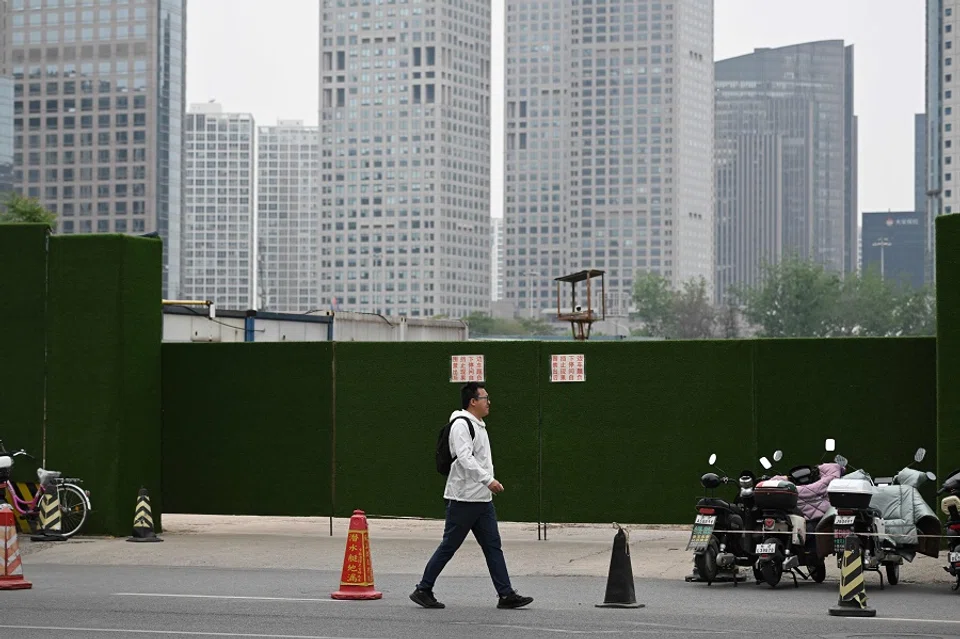Chinese local governments facing debt crisis: Waiting for bailouts
Local governments are teetering dangerously close to bankruptcy, going by the amount of debt that they have racked up. While their financial troubles are likely to ease with the China's post-Covid economic recovery, the central government is still expected to step in to prevent regional economies from toppling like a house of cards. But will certain forms of intervention do more harm than good?

"Due to limited financial resources, debt relief work has been extremely difficult, and it is impossible to effectively solve it on our own."
These remarks were shared by a Guizhou government think tank article published in early April. The rare occurrence of officials admitting the depth of their debt struggles highlights the severity of the situation and raises concerns about China's escalating local government debt.
Local governments in debt
Data released by China's finance ministry on 26 April showed that in the first quarter of this year, the country's 31 provinces, municipalities and autonomous regions issued a total of 2.11 trillion RMB (roughly US$305 billion) in local government bonds, an increase of approximately 16% year-on-year and a five-year high.
At the same time, principal and interest repayment amounted to 605.5 billion RMB in the first quarter across all regions, with loan repayment reaching less than one-third of new debt. Of the 362.4 billion RMB in principal payments, over 90% were paid through refinancing bonds, i.e., taking out a new loan to pay off existing loans.

In the first quarter, Guizhou did not make any principal payments and only paid 8.8 billion RMB in interest. It even incurred 45.6 billion RMB of new debt.
Statistics show that Guizhou's debt hit 1.25 trillion RMB last year, ranking 11th in terms of total debt in the country. However, its debt-to-GDP ratio was 61.9%, crossing the warning line of 60% and second only to Qinghai, which had a debt-to-GDP ratio of 84.3%. In contrast, the three provinces and cities with the lowest debt ratios - below 20% - last year were the more developed regions of Guangdong, Shanghai and Jiangsu.
... while central and western Chinese regions like Guizhou have less debt than developed regions, they have a higher risk of default because of their poor debt-servicing capacity.
In danger of going under
Professor Chen Bo, director of the Optical Valley Institute for Free Trade, told Zaobao that in contrast to the central government maintaining a rather healthy balance sheet in the past two years, local governments have been facing debt distress. On the one hand, their expenditures increased significantly due to Covid containment measures. On the other hand, the economic downturn led to a low return on investment, burning the candle at both ends.
Chen further analysed that developed regions have a lower risk of defaulting on their loans as local governments possess good credit scores and buyers are interested to invest. In contrast, while central and western Chinese regions like Guizhou have less debt than developed regions, they have a higher risk of default because of their poor debt-servicing capacity.
Budget reports across China show that in 2022, 22 out of China's 31 provinces, municipalities and autonomous regions saw a year-on-year decline in fiscal revenue. Revenues also fell in six provinces, while fiscal revenue growth significantly slowed in most provinces, after the implementation of large scale value-added tax (VAT) credit refunds - a market relief policy resulting in revenue loss for local governments.
... the central government is unlikely to ignore the situation and let local governments go bankrupt.

The sluggish property market has also led to a significant decline in land concession revenue, an important revenue source for local governments under government-managed fund budgets. At least 28 provinces saw a year-on-year decrease in government-managed fund revenues last year. The weak real estate market has led to a significant decline in another important source of revenue for local governments - land concession revenue included in the government fund budget.
Following Guizhou's plea for help, China Cinda Asset Management, one of China's largest distressed debt fund, announced that it would form a 50-member financial expert group to assist Guizhou particularly in serving the real economy, preventing and resolving risks, helping state-owned enterprise undergo reforms, and providing relief measures to the property sector.
Chen is optimistic that with the easing of the impact of the pandemic on China's economy, local governments' financial troubles will also decrease this year. That said, the central government is unlikely to ignore the situation and let local governments go bankrupt. It may instead bail them out in various ways, such as by asking state-owned banks or investment institutions to buy local debt, or by funding local governments in a semi-market-oriented way.

The central government could also directly fund major development projects that benefit the people, thereby allowing local governments to save their funds to pay off their debts and keep their local economies stable.
"However, the central government has always been careful about indiscriminate bond issuance and investment, and will also require local governments and the market to share the risk," Chen noted.
... while city investment enterprises were not government departments, they believed that local governments would not allow investment and financing platforms such as theirs to go bankrupt.
Hidden debt
Apart from visible debt, hidden debt accrued by city investment enterprises (state-owned holding enterprises that are involved in urban planning and construction project investment, 城投公司) and other financing platforms constituted another major risk facing local governments.
At a Chinese Communist Party Politburo meeting in late April to discuss the country's economic work, Chinese officials called for strengthened management of local government debt and for new hidden debt to be strictly controlled. Former Chinese Minister of Finance Lou Jiwei pointed out at a forum in January that as of 2020, local governments' hidden debt was estimated to be between 30 trillion and 50 trillion RMB.
Lou said while city investment enterprises were not government departments, they believed that local governments would not allow investment and financing platforms such as theirs to go bankrupt. On their part, local governments believed that they would be bailed out as the central government would not allow them to go bankrupt. Such thinking ultimately led to soaring hidden debt. He stressed that the central government should never bail out hidden debt.

Current Chinese Minister of Finance Liu Kun also said in an interview in January that regulating the management of local government financing platform companies would be prioritised in mitigating local government debt risk. His ministry would debunk the notion that the central government would definitely bail out local governments. It would also foster a "benign mechanism" for risk management with clear boundaries and responsibilities between government and enterprises, so as to promote financial sustainability.
... the central bank has been helping state-owned commercial banks buy local government debt, in a bid to maintain relative stability and optimism in the overall bond market.
To attract debt buyers, local government bond spreads are often higher than that of central government bond spreads. But as Assistant Professor Lu Xi of the Lee Kuan Yew School of Public Policy at NUS noted, local government bond coupon rates have declined amid the economic downturn over the past two years. For instance, Shenzhen's local government bond yields are as low as central government bond yields this year, although the demand for debt-buying remains high.
Lu believes the reason for this is that the central bank has been helping state-owned commercial banks buy local government debt, in a bid to maintain relative stability and optimism in the overall bond market. He said, "But the issue now is how well this bond issuance model can motivate other investors to buy debt? If the effect is minimal, bond issuance can hardly stimulate the economy and may even increase fiscal burden."

According to first-quarter data from the finance ministry, the top provinces in terms of bond issuance were Shandong, Guangdong, Sichuan and Jiangsu, with roughly 47.5% of special-purpose bonds directed towards traditional infrastructure projects such as transportation, urban construction and industrial parks. This shows that infrastructure projects remain the main means for local governments to stabilise growth.
Lu pointed out that transport infrastructure often has the greatest marginal effect in the first round of large-scale investment, even if this tapers off thereafter. Thus, pouring investment into transport infrastructure amid the presence of an already extensive high-speed railway network may not be driving investment with demand but expecting to create demand with investment. This may prove to be counterproductive in the end.
This article was first published in Lianhe Zaobao as "中国地方债风险还待化解".
Related: China local governments' fiscal stress may roll over to 2023, think tank warns | China's overreliance on land finance could lead to its downfall | China's local governments going bankrupt? | The growing difficulty of balancing China's local government budgets | China's desperate measures to avert a looming economic crisis





![[Photos] Fact versus fiction: The portrayal of WWII anti-Japanese martyrs in Taiwan](https://cassette.sphdigital.com.sg/image/thinkchina/3494f8bd481870f7c65b881fd21a3fd733f573f23232376e39c532a2c7593cbc)